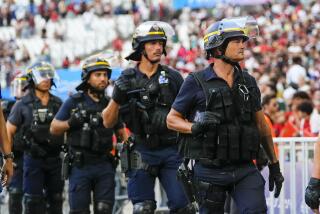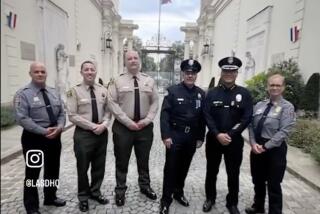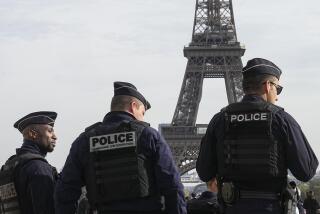Italy’s Security, Intelligence Forces Gear Up for Olympics
- Share via
ROME — Warning that terrorism remains a threat for the upcoming Winter Olympics in Turin, the Italian government announced Friday that it would deploy 9,000 security agents and establish a specialized nationwide intelligence network to protect the games.
Officials said they would follow a plan similar to the massive operation mounted for the funeral of Pope John Paul II in April. For that event, police flooded Rome, snipers were stationed on rooftops and NATO aircraft and warships patrolled the skies and water, all to safeguard hundreds of dignitaries and more than 1 million pilgrims.
Interior Minister Giuseppe Pisanu told Parliament on Friday that in light of the possibility of a terrorist attack, security forces were gearing up before the Winter Games, scheduled to begin in February.
Italy has been on alert for possible violence since threats posted on Al Qaeda-linked Internet sites named the country as a target after the transit bombings in London and Madrid.
Like Britain and Spain, Italy is one of a handful of Western European countries that sent troops to Iraq to support U.S.-led military operations, and Prime Minister Silvio Berlusconi remains one of President Bush’s most faithful allies.
On the heels of the Winter Games, a national election that could unseat Berlusconi is scheduled for April.
The combination of events could make Italy an especially attractive target, experts say, especially if Islamic radicals think they could influence the outcome of the vote.
The March 11, 2004, attacks on Madrid’s train system may have played a role in bringing down Spain’s conservative government in the election three days later.
Pisanu said authorities were not aware of any plot targeting the Olympics. “Police have prepared a large-scale, thorough plan for public order and security that is now at an advanced stage of implementation,” he said.
The plan calls for the deployment of 9,000 security officers, Pisanu said, and the creation of a network linking 21 centers with access to police and intelligence agencies from other nations.
Maurizio Laudi, the top terrorism prosecutor in Turin, recently told reporters that authorities were also worried about violent demonstrations by anti-globalization activists and anarchists who have disrupted international events in Italy.
Turin is located in northern Italy, where most of the country’s Muslim immigrant population is concentrated, including a small number of extremists who police believe have provided support for attacks in Iraq and elsewhere. An allegedly radical imam in Turin was recently deported.
Security was an enormous concern before the Summer Games in Athens last year. Western law enforcement officials who work with the Italians rank their skills above the Greeks’ because of a longer tradition of cooperating with the North Atlantic Treaty Organization, United Nations peacekeeping missions and other international forces. Italian security services also are known to be especially adept at using wiretaps to monitor suspected militants.
The Italians come in for criticism, however, on their propensity for internecine battles among the numerous agencies responsible for security.
In addition, the government has already reported multimillion-dollar shortfalls in the budget earmarked for security programs.
Olympic organizers sought to downplay fears of attack. “The aim of the terrorists is to frighten us, but we should not be scared,” Valentino Castellani, president of the Turin 2006 organizing committee, told the ANSA news agency Friday. “Normality is the best response to the terrorist threat.”
More to Read
Sign up for Essential California
The most important California stories and recommendations in your inbox every morning.
You may occasionally receive promotional content from the Los Angeles Times.














